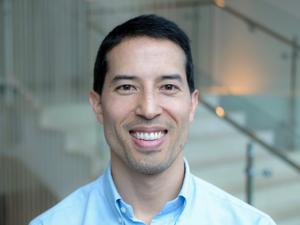
James White is unapologetically anti-racist, pro-Black, pro-LGBTQIA+ and feminist. And not apolitical. His new book is, too.
Originally from St. Louis, Missouri, White, 61, is the former CEO of Jamba Juice and the first member of his family to graduate from college. He also held executive leadership positions at major corporations like Safeway and Nestle Purina. Throughout his career, he oversaw efforts to change corporate culture in ways that address systemic racial and sexist biases. Now he wants to help leaders at any type of organization take similar action.
In 2020, White started writing his upcoming book, "Anti-Racist Leadership: How to Transform Corporate Culture in a Race-Conscious World," with his daughter, Krista White.
They started conceptualizing a book the year before. Then the pandemic and George Floyd's murder made the mission feel even more urgent. In the book, which launches on March 22, James and Krista take from their own experiences to lay out approachable strategies that leaders can use to implement anti-racist policies and, as they write in the book, "be a force in the betterment of society, as opposed to following the Milton Friedman doctrine that the only social responsibility of business is to increase profits for its shareholders."
I recently spoke with James over Zoom from our homes in Pleasanton and San Francisco, respectively, about the themes of the book, generational change and whether he plans to ever fully retire.
Can you tell me a little bit about your childhood?
We were a working class family. My parents were really the instrumental influences from an education perspective. And my mom would have been kind of the towering influence. In the fourth grade, I was in a class that was total chaos. We had various substitute teachers across that entire fourth grade year. As a result, I ended up being tracked into a slow fifth grade class and I watched my mom intervene, and a lot of the things that I believe today about leadership and empathy and compassion was all demonstrated by my mom. She intervened and put me on a really different course. We had a shy, introverted kid that you put in a totally chaotic system. He got lost. And I wonder how many young people got lost that didn't have my mom and dad.
A lot has changed over the past 50, 60 years. There's been setbacks, there's been progress. Why did you write this book now?
The genesis of the book really goes back almost three years ago. I was doing a consulting project with a board that I sat on, and I invited Krista to join me. Subsequently, we did several other projects together and looked at each other and said, we have a combination of her view as a millennial and my 30 years of experience, there's probably some stories that might help others. All of 2019 we had been working together on these consulting projects, and in 2020 we started the book in earnest. The pandemic and the racial reckoning really further shaped the book, made it more urgent for this book to live in the world. And Krista’s influence significantly increased in terms of her voice in the book. I don't know if you recall the introduction, but I'll read it if you don't mind.
"This book is not apolitical. This book is explicitly anti-racist, pro-Black, pro-LGBTQ and feminist. This book takes the stance that Black Lives Matter, that LGBTQ+ rights are human rights, that people of all abilities deserve respect and access, and that people of all genders have the right to sovereignty over their bodies and identities. This book acknowledges that capitalism is built on a foundation of systemic racism and that to have a truly diverse, equitable and inclusive work environment we must acknowledge the historic and present injustices faced by marginalized people."
That's the most direct kind of impact of this intergenerational learning that we think this project brings to life. There was a person on the team that said, James, you're a mainstream businessperson, do you care if you ever work again? And I said, not really. This is work that has to be done. For us, this is a passion project and hope to be a catalyst for this conversation.
So, I'd like to talk more about the introduction. Do these ideas conflict? Can there be such a thing as anti-racist capitalism or anti-racism within a system of capitalism?
Absolutely. And I think the bigger picture for how we think about this work is all about the institution, the enterprise. It's about policies and processes. We've got to step back, acknowledge the systems, and understand where there are places in the processes, the systems, the rituals inside of companies, the symbols inside of companies, that might disadvantage some portions of the underrepresented folks inside of companies. It's a systemic kind of process-oriented way to think about it. On an individual basis, I'm not sure you can make sustainable progress.
And if the CEO isn't making this a priority, it's just not going to happen, right?
Right. I don't believe the CEO can delegate this work. And the point that I've made is anti-racist work, working around inclusion or diversity, can't be separated from the culture of the company. That doesn't mean there aren't many other people that are important to making this work sustainable. One of the most critical places where this work has to be deeply embedded in the company and the culture is in middle management because the reality for any company is that's the group that most people work for.
Have you ever experienced pushback from middle management when you've come in and tried to change the culture?
Absolutely, there's always pushback. I think the other thing that ends up being important is that the leaders are effective listeners to really understand what the nature of the pushback or where the issues and challenges are, and they create space for us to understand our differences. But once we've charted a place that we're going to go in terms of the values of the company and the culture, and give people space and time to onboard, sometimes you'll have people that decide, 'hey, this isn't for me,' and they free up their futures to go do something else. And I think that's perfectly fine. The most important thing that I've seen is the best leaders and CEOs take themselves on this learning journey with the organization. Because there are no experts at this war. One thing Krista taught me is that this is going to evolve over time. The language is going to change. What we emphasize is going to change.
How can corporations hold their CEOs accountable, once this conversation is happening, so that it doesn't just become something that is a one off project or forgotten about or deprioritized?
I might turn it and make the point differently. I think the best CEOs, they view this as a critical part of their responsibility. So when I was CEO of Jamba, talking about social issues might have been optional. I don't think it is now as we look at the growing demand, even from investors, around ESG. And really, this anti-racist leadership or DEI work is the 'S' in the ESG. You can't have a business conversation today in the boardroom, or otherwise, where that's not a topic of discussion. There's more reporting happening there. So where this might have been optional a decade ago or six years ago, this is not an optional skill set for the leader.
One of the things that 2020 exposed, and it was exposed by a combination of employees and consumers holding management teams accountable, there were many, many management teams that were incredibly awkward in 2020 around this discussion related to race. I think we've all got to move to a place where we get more comfortable with being uncomfortable. We've all got to take ourselves on a learning journey. So I think the work has already started.
You also wrote about how nobody ever just saw your potential, right? You always had to prove it. So how do leaders break that cycle for their teams right now? Because it gets to implicit bias.
I think it's just acknowledging it and being aware of it. If you've never experienced it, you don't think about it. For me, every time I'd get a promotion across my career, I was always prepared because I had to prove it again. It's like running an extra couple laps around the track each time so I could always go into the next opportunity incredibly confident that I could do the work.
You also write about fostering a true meritocracy. What do you mean by that? What's a true meritocracy, and how would a leader foster that?
I think we start with looking at all the systems and all the processes inside the company from how we hire people to how we decide on who ends up on the key projects because I think most of us have experienced where the same set of names get called for the key projects. And I think if there is a bit of a pause taken to say, 'is this the most complete use of all the talent inside the organization?' If it's not, how can I make this team more representative of the makeup of the company or more representative of the makeup of the client that we're servicing?
This gets back to that middle management point. The middle managers really have to get that, and they've got to create an environment where they're viewing talent, making assignments in the same way so that everybody has equal access to the same set of tools, same set of resources, same set of opportunities, and then they're judged on the same basis for promotions, key projects, bonus, etc. It sounds simple, but it doesn't happen most places in the real world.
That's how it should work ideally, but it just doesn't for lots of reasons. Implicit bias, explicit bias, explicit racism, misogyny, all of these things.
To the extent that we can build this into policy and practice, you know, something that intervenes in a way because what we're trying to do is reverse the biased systems that have been historically in place. And that's why we talk about working on systems and processes.
Isn't that what affirmative action was supposed to do? California recently instituted quotas for gender ratios on boards. Does affirmative action need a rebrand or do we just need to have a completely different conversation?
As I think about where we sit today and, like anything else that is important in business, it needs to be a metric. I'm not prescriptive on what the metrics are for individual companies. But I do believe for us to see real sustainable change, each organization needs to decide what's important and then it needs to be measured and incentivized.
So whatever the goal is at your organization, set goals and measure progress, essentially?
Right. And it can be quantitative and qualitative. And where we find bias or inequity, we're going to remove those. Start where you are, but start and take action.
Thinking back over the whole course of your career, is there anything that you would have done differently?
I think the only thing that I might have done differently is I might have migrated myself more to faster growing high tech businesses sooner.
Will you ever retire? I hope you find time to relax.
My dad only retired at 87. It was because of COVID. My dad was back at the St. Louis airport up until 87. He was doing two days of work, and if he could go back today at 89, almost 90, he would go back. But we won't let him because of COVID. So, if he is a bit of a benchmark, I'll always be doing something.
Is there anything else that you would like to add?
I think the most important thing that I would kind of finish on is the importance of intergenerational learning for this next set of leaders. We've got more different generations in the workforce today. And I think that's a really important thing for leaders to think about. That's what gives me the most hope that things will change dramatically. We've got some generations like your generation, and Krista’s generation, where you just have a different expectation. And I love that you guys are holding us more accountable.






